Other
Hognosesam: Pulleys and Gears
This site gives a small amount of space to pulleys, and then provides a wealth of information about gears.
Integrated Publishing
Integrated Publishing: Pulley Mechanical Advantage
Good illustrations and explanations for finding the mechanical advantage of pulley systems.
Science Buddies
Science Buddies: Give Yourself a Lift: Lightening the Load With Pulleys
Before the Industrial Age, people relied on muscle power for moving and lifting heavy objects. Here's a project that shows you how you can use your head to make heavy lifting easier on your muscles - and your back.
TryEngineering
Try Engineering: Pulleys and Force
Students work in teams to learn how pulleys and pulley systems impact everyday life. This activity explores the concept of force and shows how the use of pulleys can greatly reduce required force.
Sophia Learning
Sophia: Practice W/ Ropes & Pulleys: Lesson 2
This lesson provides the learner with an example problem on determining the net force acting on objects within a rope and pulley system. It is 2 of 2 in the series titled "Practice w/ Ropes & Pulleys."
Sophia Learning
Sophia: Simple Machines: Pulley: Lesson 2
This lesson will explain how to calculate the mechanical advantage of a pulley system. It is 2 of 3 in the series titled "Simple Machines: Pulley."
Sophia Learning
Sophia: Simple Machines: Pulley: Lesson 3
This lesson will explain how to calculate the mechanical advantage of a pulley system. It is 3 of 3 in the series titled "Simple Machines: Pulley."
Scholastic
Scholastic: Dirtmeister's Science Reporters: Simple Machines: Pulley
With-it explanation of how the pulley works, where it's found. Most interesting, as Scholastic material usually is.
Other
Colts Neck Township Schools: Hands on Technology: Marvelous Machines: Pulleys 2
Student handout for conducting an experiment in using one pulley or two pulleys to lift a load.
The Franklin Institute
Franklin Institute Online: The Pulley
This site provides an easy to understand experiment that will demonstrate the pulley to students in grades K-3. It requires only everyday materials. The students are encouraged to discover some of these concepts for themselves and apply...
Walter Fendt
Walter Fendt: Pulley System
An interactive activity which demonstrates systems of two, four. and six pulleys.
TeachEngineering
Teach Engineering: Machines and Tools, Part Ii
In this activity, students gain first-hand experience with the mechanical advantage of pulleys. Students are given the challenge of helping save a whale by moving it from an aquarium back to its natural habitat into the ocean. They set...
Utah Education Network
Uen: Lifting the Load
Discover how much force is needed to lift objects without and with a pulley.
Sophia Learning
Sophia: Forces in a Rope & Pulley System: Lesson 2
This lesson explains what forces are acting on objects which are at rest or moving in a rope and pulley system. It is 2 of 2 in the series titled "Forces in a Rope & Pulley System."
Sophia Learning
Sophia: Net Force in Rope & Pulley Systems: Lesson 2
This lesson demonstrates how to find the net force acting on objects in a rope and pulley system. It is 2 of 2 in the series titled "Net Force in Rope & Pulley Systems."
Sophia Learning
Sophia: Net Force in Rope & Pulley Systems: Lesson 1
This lesson demonstrates how to find the net force acting on objects in a rope and pulley system. It is 1 of 2 in the series titled "Net Force in Rope & Pulley Systems."
Sophia Learning
Sophia: Representing Forces in a Rope & Pulley System: Lesson 2
This lesson demonstrates how to draw a free-body diagram for a rope and pulley system. It is 2 of 2 in the series titled "Representing Forces in a Rope & Pulley System."
Concord Consortium
The Concord Consortium: Molecular Workbench: Weight Balance on a Pulley
Watch how the placement of two weights attached to a chain on different sides of a pulley affect the movement of the system. You can adjust the heaviness of the weights.
TeachEngineering
Teach Engineering: Simple Machines From Pyramids to Skyscrapers
Simple machines are devices with few or no moving parts that make work easier, and which people have used to provide mechanical advantage for thousands of years. Students learn about the wedge, wheel and axle, lever, inclined plane,...
TeachEngineering
Teach Engineering: The Power of Mechanical Advantage
Students learn about the mechanical advantage offered by pulleys in an interactive and game-like manner. By virtue of the activity's mechatronic presentation, they learn to study a mechanical system not as a static image, but rather as a...
TeachEngineering
Teach Engineering: Levers That Lift
This lesson introduces students to three of the six simple machines used by many engineers: the lever, the pulley, and the wheel-and-axle. In general, engineers use the lever to magnify the force applied to an object, the pulley to lift...
TeachEngineering
Teach Engineering: Simple Machines
Through a five-lesson series with five hands-on activities, students are introduced to six simple machines - inclined plane, wedge, screw, lever, pulley, wheel-and-axle - as well as compound machines, which are combinations of two or...
Walter Fendt
Walter Fendt: Sistema De Poleas
This site is an interactive applet using the principles of a pulley system. The number of pulleys can be varied as well as the load lifted
Educaplus (Jesús Peñas Cano)
Educaplus: Dinamicas De Dos Masas Que Cuelgan De Una Polea [In Spanish]
This is a short demonstration to see the dynamics of two masses connected by a pulley.
Other popular searches
- Science Project on Pulleys
- Pulleys and Gears
- Simple Machines Pulleys
- Pulleys and Levers
- Pulleys, Wheel and Axle
- Inclined Planes & Pulleys
- Levers and Pulleys Science
- Science Pulleys
- Physics Pulleys
- Science Forces and Pulleys
- Simple Machines / Pulleys
- Levers and Pulleys Project




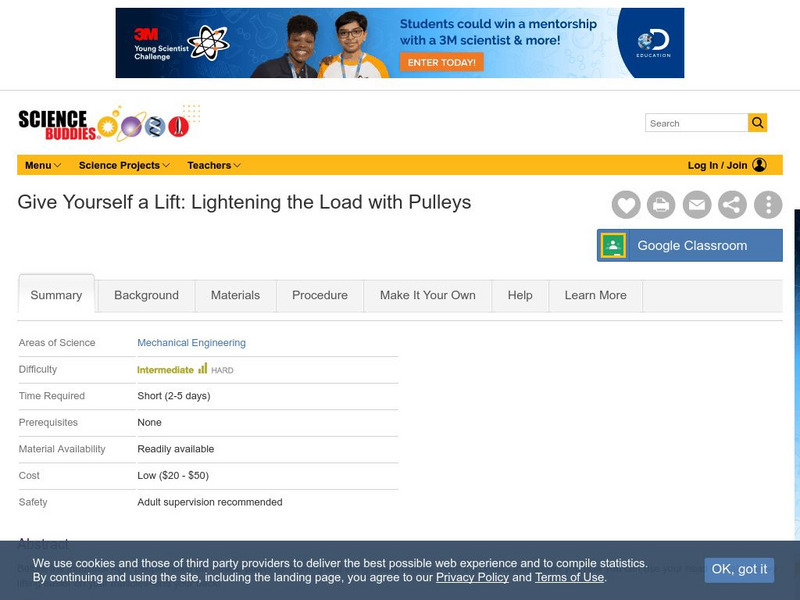





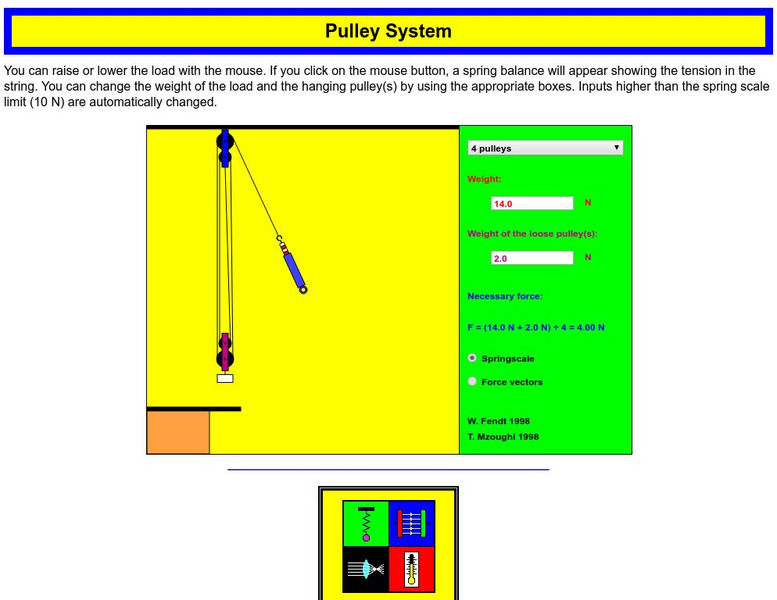


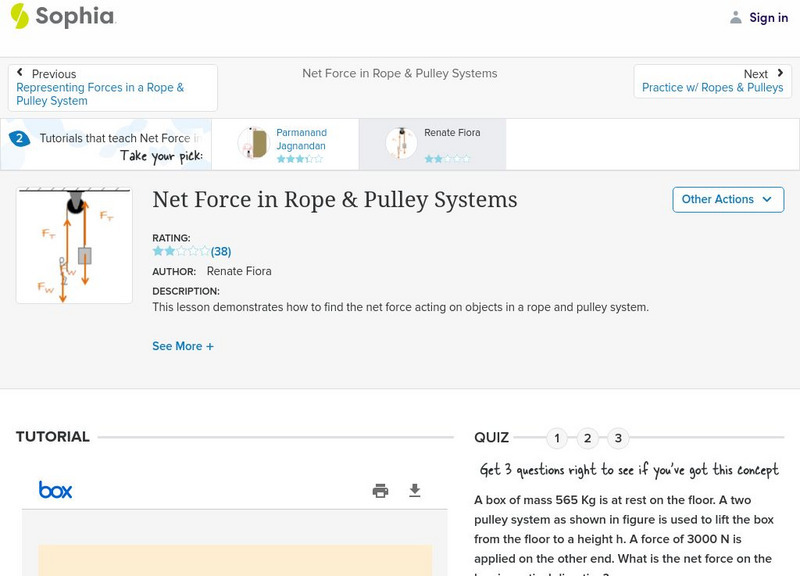

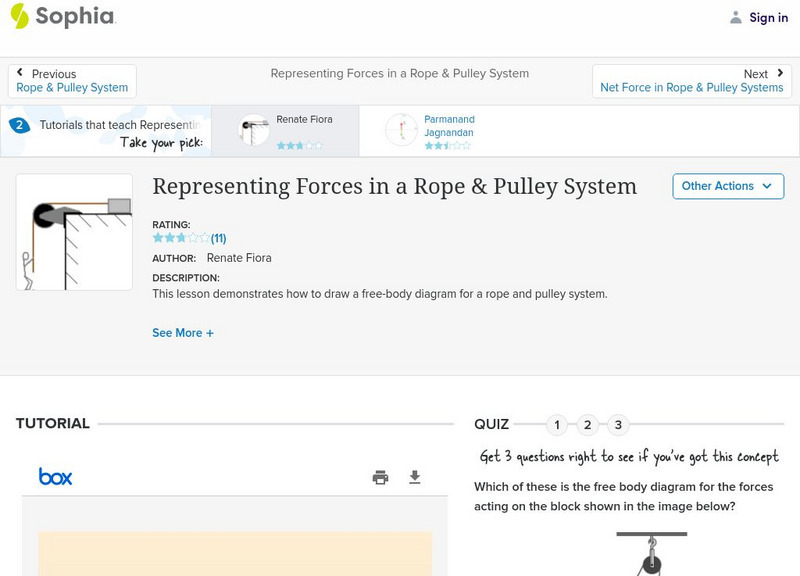


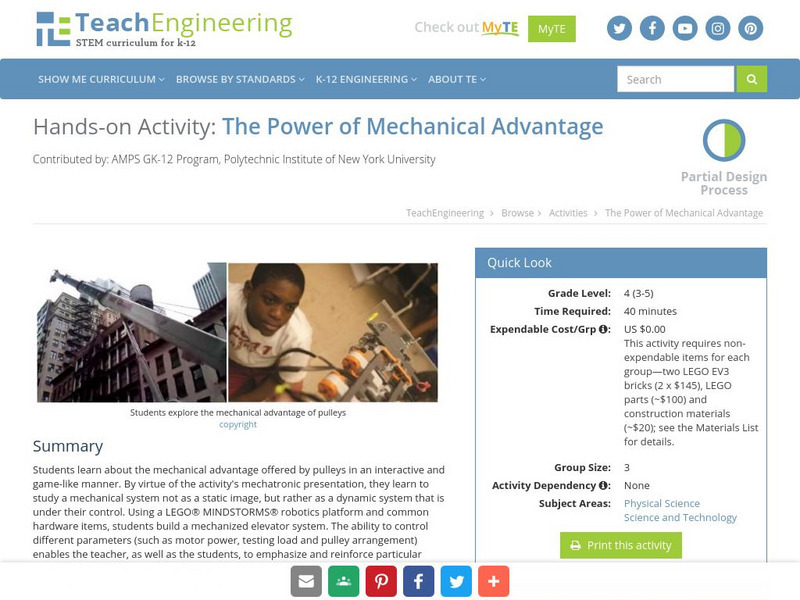
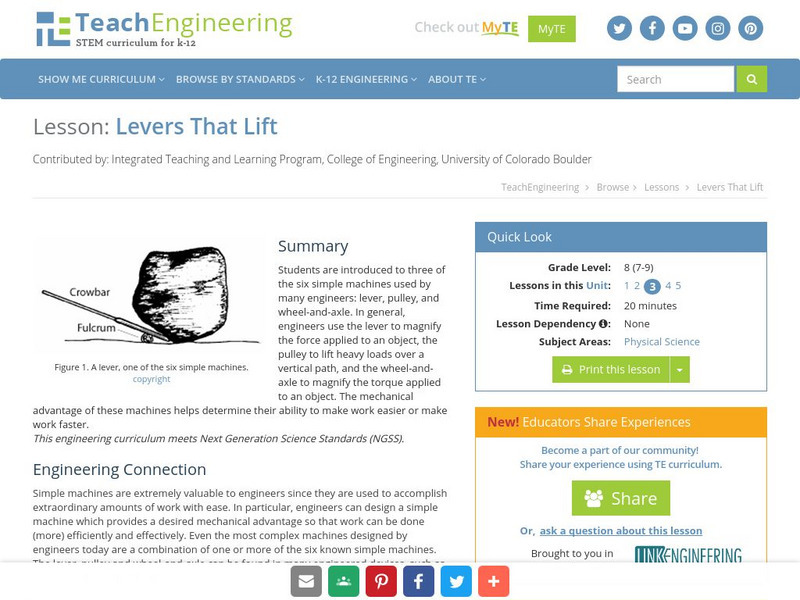
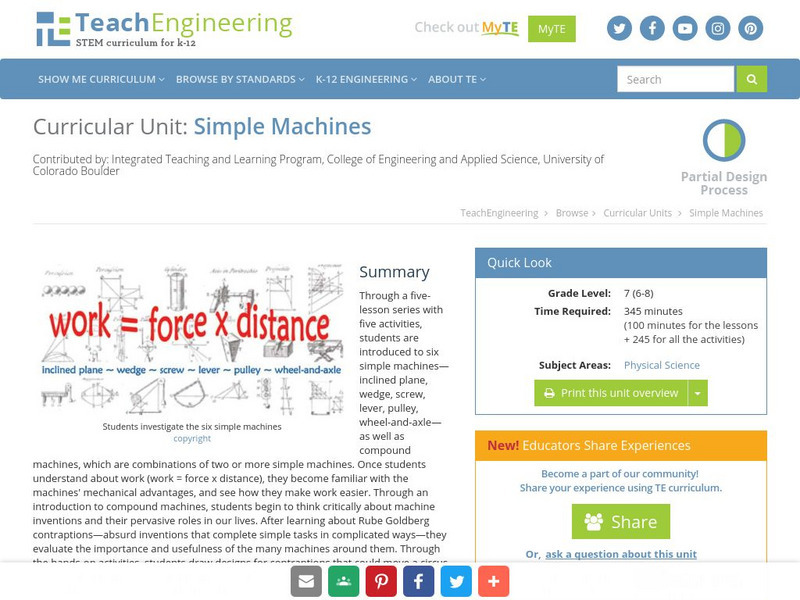

![Educaplus: Dinamicas De Dos Masas Que Cuelgan De Una Polea [In Spanish] Interactive Educaplus: Dinamicas De Dos Masas Que Cuelgan De Una Polea [In Spanish] Interactive](https://content.lessonplanet.com/knovation/original/408860-61c268f12e47634bb4f222f816b18bf7.jpg?1661771905)